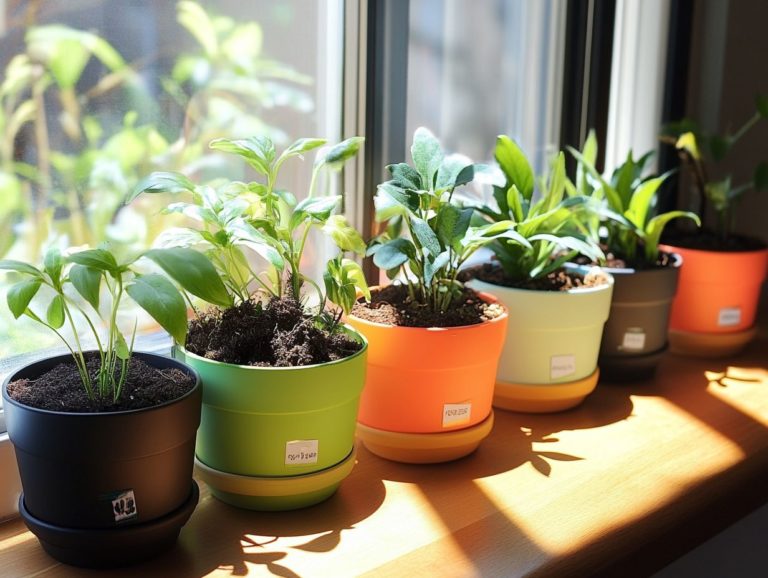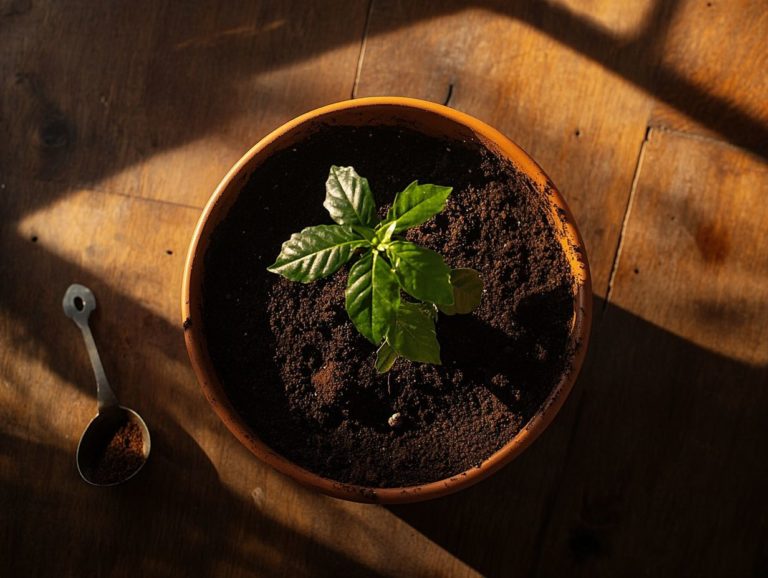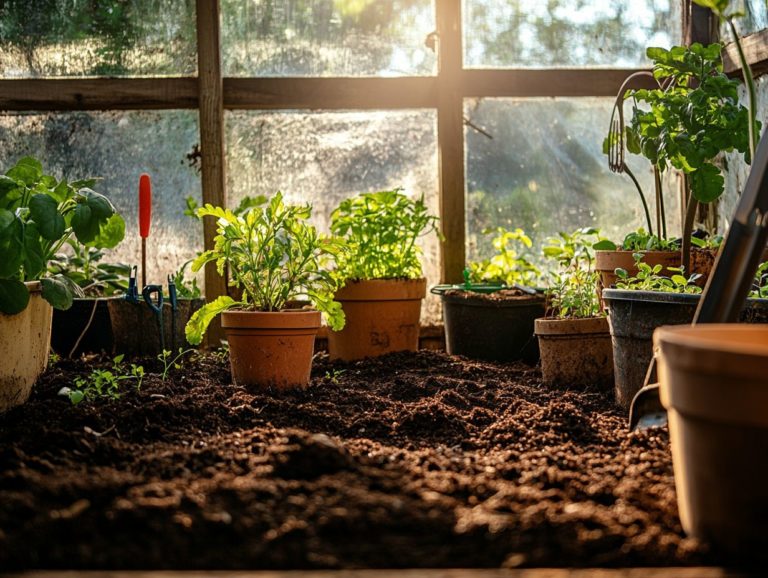Essential Soil Management Practices for Plants
Healthy soil serves as the cornerstone of flourishing plants and vibrant gardens. Grasping the nuances of soil management is vital for ensuring optimal growth and sustainability.
Let’s dive into why soil management matters and how you can achieve it. This article presents reliable soil testing methods and tools at your disposal. Insights from Penn State Extension can provide additional guidance.
Uncover strategies to enhance soil quality through nutrient amendments and pH adjustments. Select the right crops tailored to your unique soil conditions.
Master essential techniques for maintaining soil health. This includes pest control and effective watering strategies. Get excited about building a thriving garden through smart soil management practices that focus on organic matter and nutrient balance!
Contents
- Key Takeaways:
- Understanding Soil Management
- Soil Testing and Analysis
- Improving Soil Quality
- Choosing the Right Plants for Your Soil
- Maintaining Soil Health
- Weed and Pest Control
- Proper Watering and Fertilization Techniques
- Soil Aeration and Mulching
- Frequently Asked Questions
- 1. Want to know the key practices for healthy soil?
- 2. How often should I irrigate my plants for optimal soil management?
- 3. Why is soil testing important for plant growth?
- 4. What is the benefit of crop rotation in soil management?
- 5. How can I control weeds and pests in my soil without harmful chemicals?
- 6. Is it necessary to regularly monitor and maintain soil pH levels?
Key Takeaways:
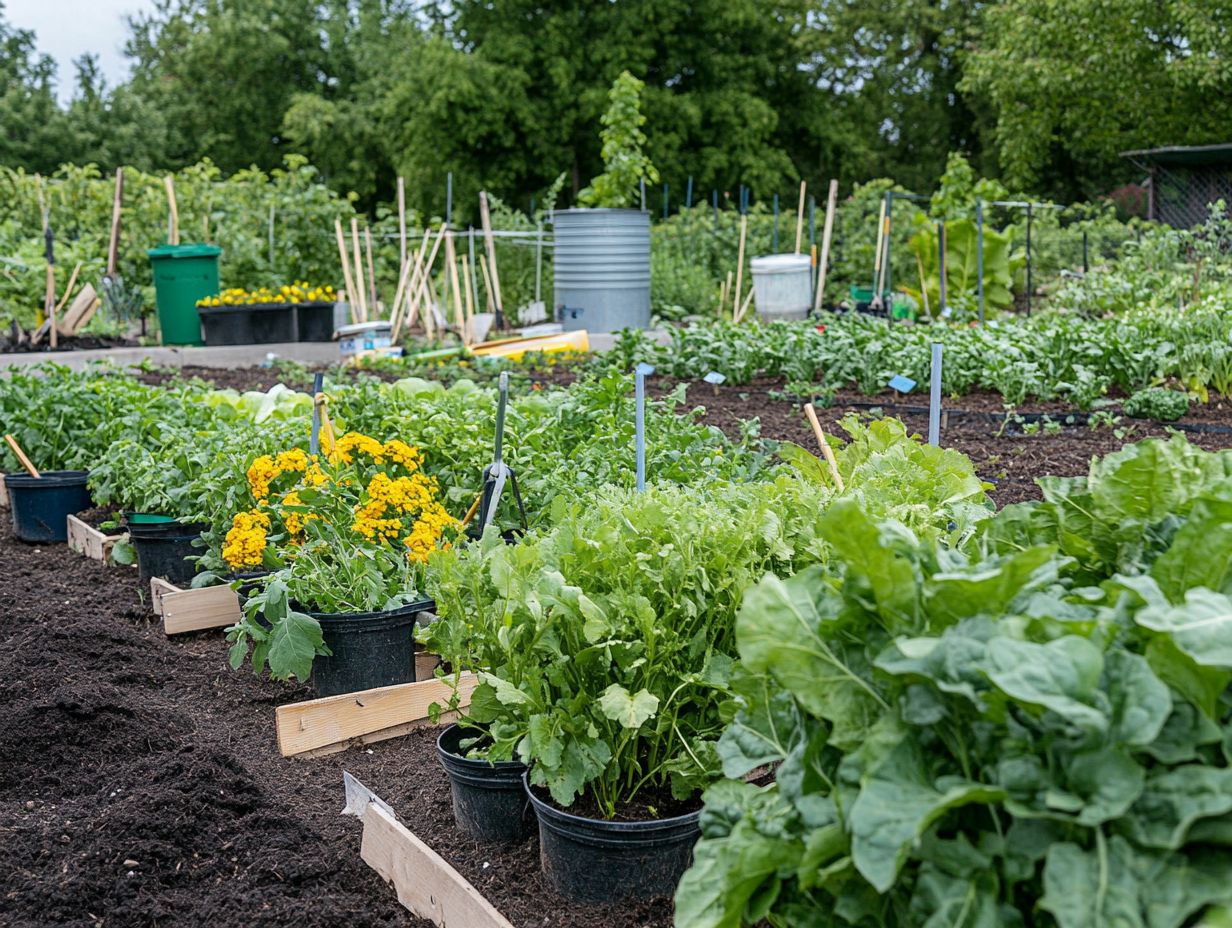
- Soil management is crucial for healthy plant growth. It requires testing, analysis, and improvement of soil quality, including nutrient levels and soil pH.
- Choosing the right crops for your soil is essential. This ensures their survival and proper growth while enhancing soil fertility.
- Maintaining soil health involves controlling weeds and pests. Proper watering, fertilization, regular soil aeration, and mulching are also important.
Understanding Soil Management
Grasping the intricacies of soil management is essential for nurturing soil health. This vital practice directly impacts crop production and includes various farming methods designed to enhance soil quality.
By adopting effective soil management techniques, you can optimize soil structure and biological activity, including helpful fungi that assist plants in nutrient uptake and earthworms. This secures sustainable crop yields while tackling issues such as soil erosion and nutrient depletion.
Importance and Goals of Soil Management
The significance of soil management is rooted in its capacity to uphold soil health. This is a cornerstone for achieving optimal crop production and ensuring long-term soil fertility through sustainable practices.
By employing effective soil management practices, you can enhance the functionality of the ecosystem. Strategies such as compost application can enrich your soil with organic matter and nutrients, fostering beneficial microbial activity.
Crop rotation is another powerful tool. It breaks pest cycles and reduces disease prevalence, allowing for a diverse and resilient cropping system.
Focusing on moisture conservation techniques like mulching and cover cropping not only helps retain soil moisture but also enhances soil structure and fertility.
Together, these practices elevate your immediate crop yields and contribute significantly to sustainable agriculture. This ensures that future generations can enjoy fertile, productive soils.
Soil Testing and Analysis
Soil testing and analysis are essential for grasping the current state of soil health. By assessing parameters such as soil pH and nutrient levels, you can make informed agricultural decisions.
Methods and Tools for Soil Testing
Various methods and tools for soil testing provide valuable insights into soil composition and overall health. These are vital for effective nutrient cycling and optimal agricultural practices.
By leveraging a combination of laboratory analysis and field tests, you can gain a thorough understanding of your soil’s unique qualities. Laboratory analyses encompass tests for pH, nutrient levels, and organic matter content.
Field tests may involve straightforward techniques such as the ribbon test or soil moisture assessments. Utilizing tools like soil augers, moisture meters, and pH test kits can significantly enhance the accuracy of your evaluations.
Implementing these soil testing methods gives you the power to achieve improved soil management outcomes. This allows you to tailor your practices and ensure your crops receive the precise nutrients and conditions they need for flourishing growth.
Start your soil management journey today for a healthier garden tomorrow!
Improving Soil Quality
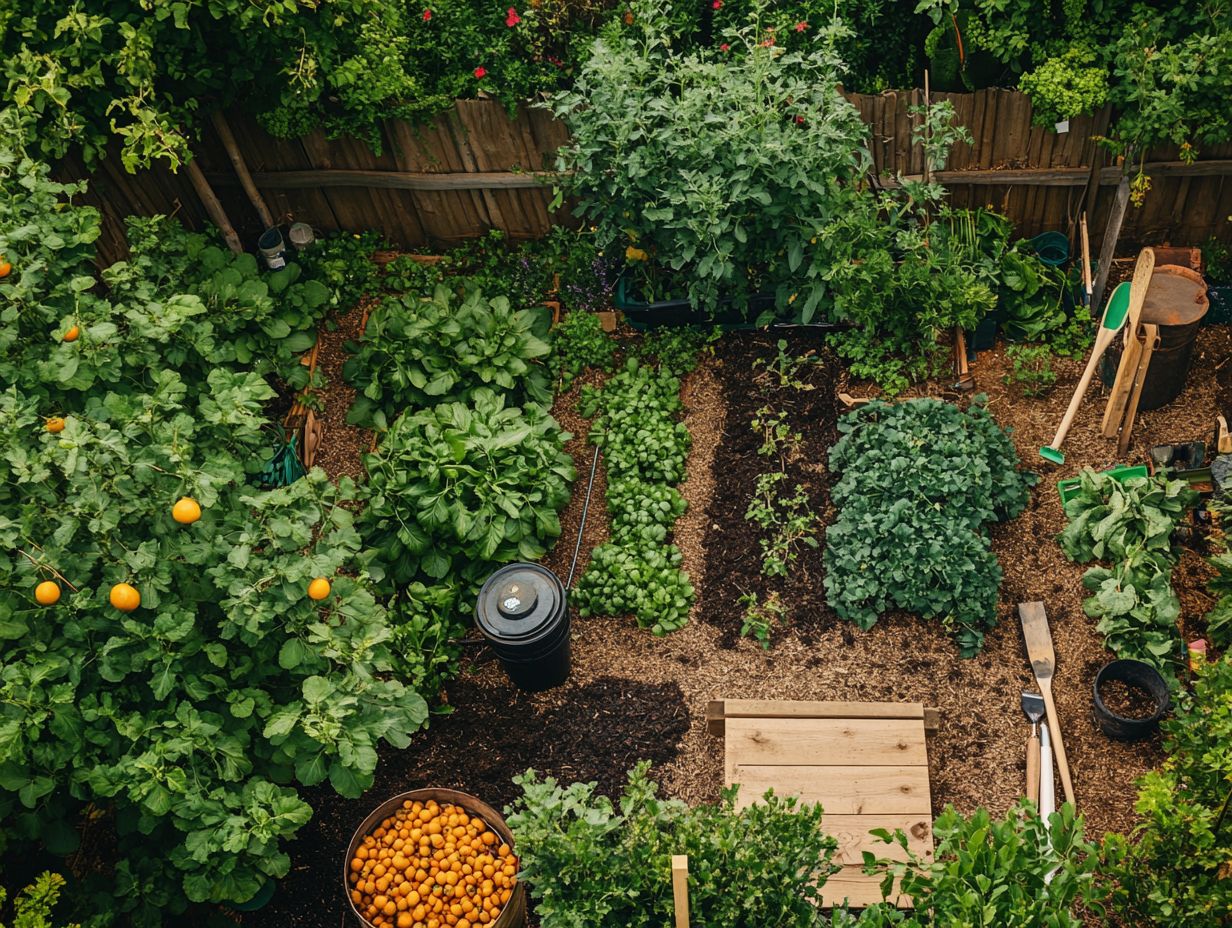
Improving soil quality encompasses a range of effective methods designed to increase organic matter and refine soil structure.
This ensures crops have access to essential nutrients like calcium, magnesium, and nitrogen.
By implementing these techniques, you can cultivate a fertile foundation that fosters robust plant health and maximizes agricultural productivity through sustainable practices.
Amending Soil with Nutrients and Organic Matter
Amending soil with essential nutrients and organic matter is crucial for boosting soil fertility and enhancing the activity of beneficial soil organisms such as microorganisms, earthworms, and a type of fungus that helps plants absorb nutrients.
To achieve the best results, you can employ various strategies, such as:
- incorporating compost
- planting cover crops
- utilizing specific fertilizers tailored to your soil’s needs
Understanding your current nutrient levels is fundamental; it gives you the power to make informed decisions about which amendments will yield the most benefits.
For example, introducing compost not only enriches the soil with organic matter but also enhances its structure, allowing for improved water retention.
Similarly, cover crops can fix nitrogen and reduce erosion, creating a thriving ecosystem.
By thoughtfully applying these strategies, you can significantly enhance soil health and productivity in your agricultural systems.
Controlling Soil pH and Drainage
Controlling soil pH and ensuring proper drainage are essential for maintaining soil quality and optimizing your agricultural practices for better crop yields.
The balance of soil pH directly influences the availability of crucial nutrients like nitrogen, phosphorus, and potassium, not to mention the overall health and growth potential of your plants.
When the pH swings too high or too low, nutrients can become locked away, resulting in deficiencies that stifle plant development.
Effective drainage is equally important; without it, waterlogging can suffocate roots and create a breeding ground for disease.
Regular soil testing is vital! It gives you the power to make informed decisions about amendments while adjusting both pH levels and drainage solutions.
This proactive approach ultimately enhances soil fertility and boosts your crop yield.
Choosing the Right Plants for Your Soil
Selecting the right plants for your soil is essential for successful crop production and ensuring the sustainability of your agricultural systems. Different crops possess unique requirements and significantly influence soil quality, making this choice crucial to your overall success.
Factors to Consider when Selecting Plants
When selecting plants, it s essential to consider factors like soil quality, nutrient levels, and how certain crops can contribute to moisture conservation.
These elements are critical in determining both plant health and overall yields. Healthy soil rich in organic matter promotes robust root systems that enhance nutrient uptake and moisture retention.
You can also benefit from practices like companion planting. By pairing certain crops together, you can naturally deter pests and encourage beneficial insect populations.
Crop rotation plays a vital role as well; it helps break disease cycles and balances soil nutrients, which is crucial for maintaining agricultural productivity over the long term.
By implementing these strategies, you significantly enhance the resilience and vitality of your garden ecosystem.
Maintaining Soil Health
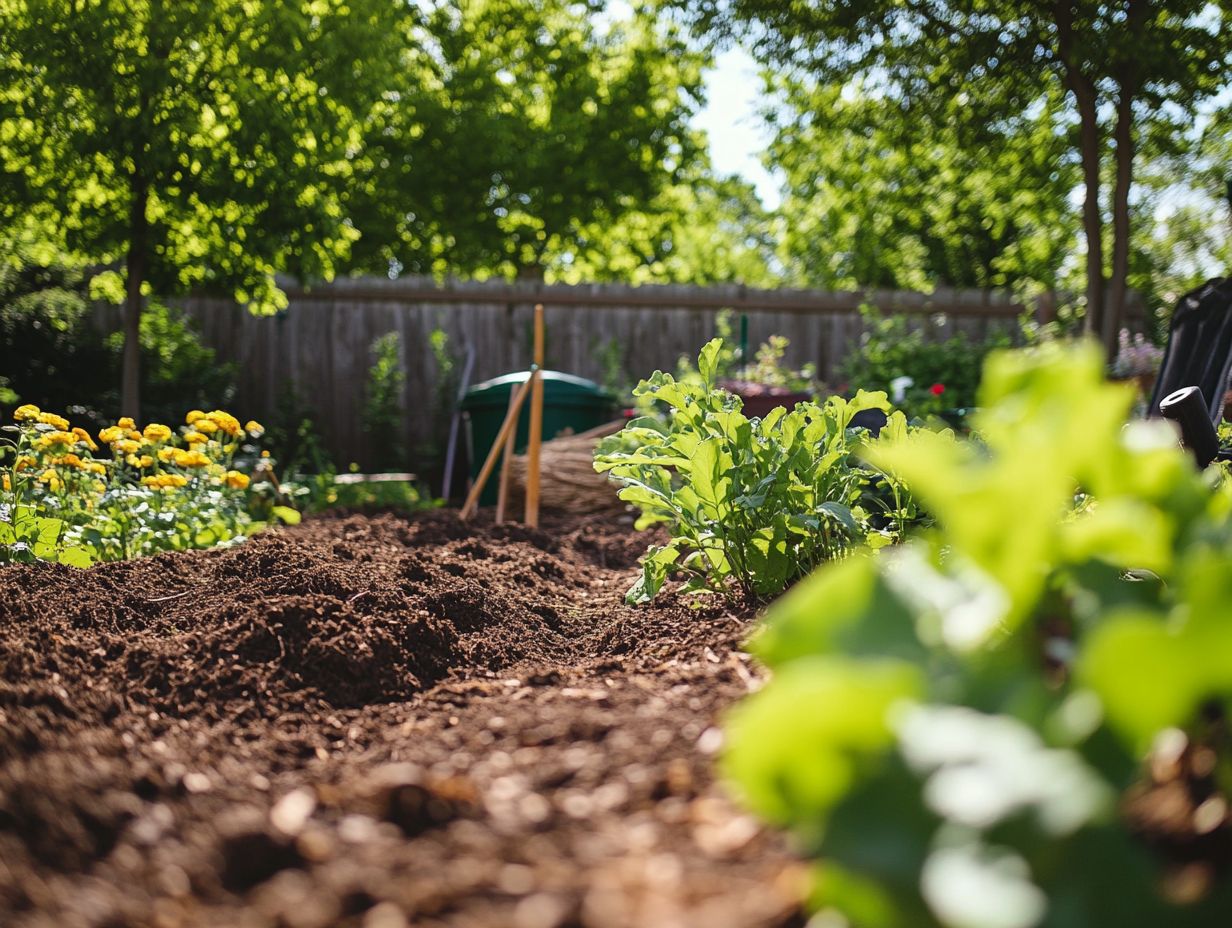
Maintaining soil health is essential for sustaining agricultural productivity. You must implement effective strategies for weed control, pest management, and soil aeration to achieve this.
Weed control prevents competition for nutrients, while pest management protects plant health.
Weed and Pest Control
Efficient weed and pest control strategies are essential for maintaining soil health and enhancing crop yields in agricultural practices.
Use a combination of mechanical methods like tilling and mowing to manage weeds. Alongside this, targeted chemical applications can help control unwanted pests.
Incorporating cultural practices, such as crop rotation and cover cropping, promotes the variety of life in your fields and disrupts pest cycles.
These integrated approaches not only aid in controlling weeds and pests but also align with soil health initiatives. By reducing compaction and improving nutrient cycling, you foster a thriving ecosystem that supports sustainable agricultural productivity.
Proper Watering and Fertilization Techniques
Implementing proper watering and fertilization techniques is essential for optimizing nutrient levels and maintaining adequate soil moisture for healthy crop growth.
Explore various watering methods, such as drip irrigation, which delivers water directly to the roots. This ensures minimal evaporation and optimal utilization. Also, consider incorporating rainwater harvesting systems to enhance water availability while reducing dependence on groundwater.
Alongside these watering strategies, understanding the unique nutrient requirements of your crops is crucial. Techniques like composting and using organic fertilizers can significantly improve soil health and fertility, making nutrients more accessible for your plants.
Monitor your soil moisture closely to ensure your plants thrive. By recognizing the balance of soil moisture and the specific needs of your crops, you can make informed decisions that lead to improved yields and sustainable agricultural practices.
Soil Aeration and Mulching
Soil aeration and mulching are invaluable practices for enhancing soil health. They greatly aid in moisture conservation and improve nutrient availability.
These techniques promote better root penetration and gas exchange. They also nurture the intricate ecosystem of microorganisms that flourish in well-aerated soil. When applied thoughtfully, tillage practices can effectively break up compacted layers, creating a favorable environment for plants to access essential nutrients.
Applying mulch also creates a protective layer, minimizing erosion and maintaining temperature stability within the soil. This harmonious interplay between aeration and mulching fosters vibrant biological activity, ultimately leading to more resilient and productive agricultural systems.
Frequently Asked Questions
1. Want to know the key practices for healthy soil?
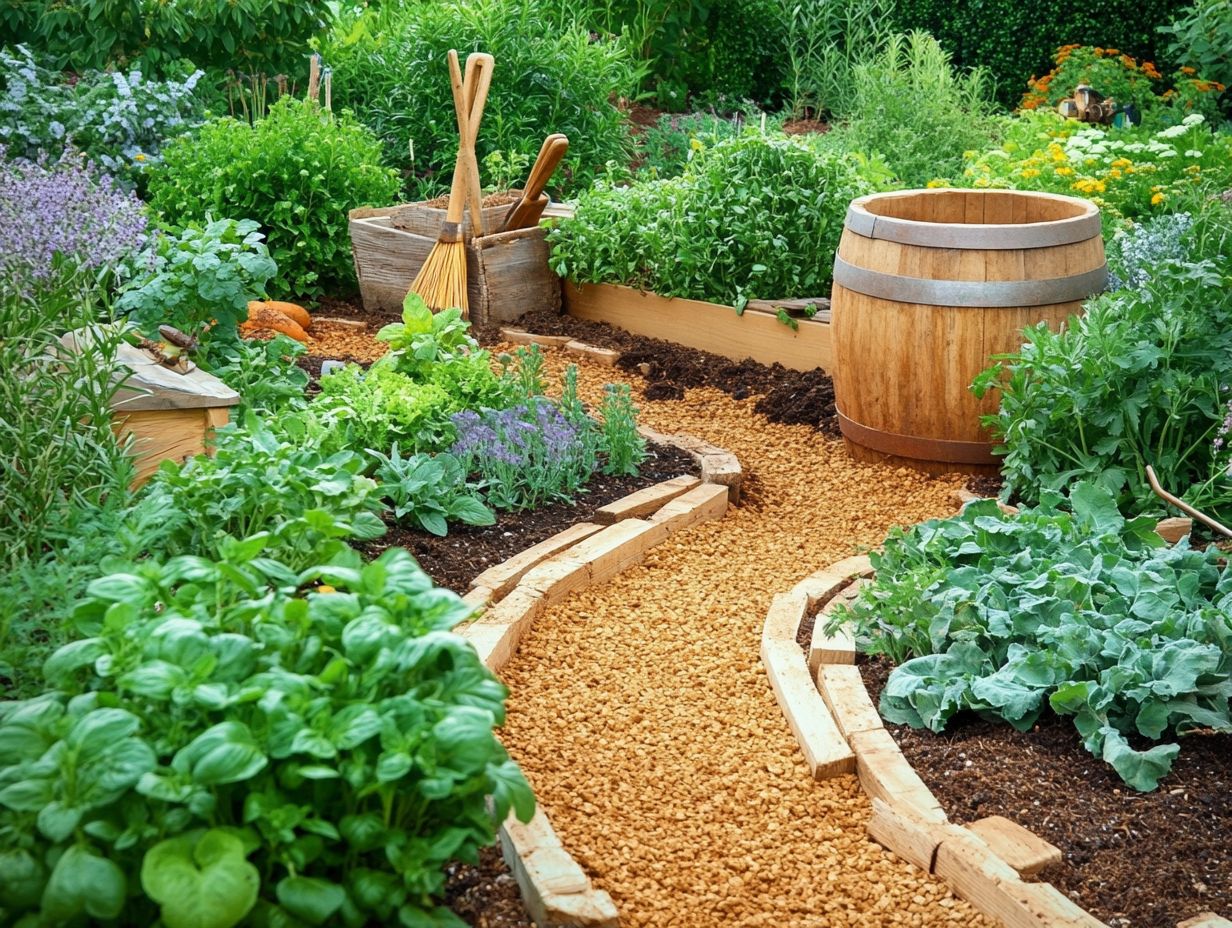
Essential soil management practices for plants include proper irrigation, soil testing and fertilization, crop rotation, weed and pest control, and maintaining balanced soil pH levels.
2. How often should I irrigate my plants for optimal soil management?
The frequency of irrigation depends on various factors such as soil type, plant type, and weather conditions. Monitor soil moisture levels and water accordingly to prevent over or under-watering.
3. Why is soil testing important for plant growth?
Soil testing helps determine nutrient levels and pH balance, which are crucial for plant growth. It also identifies any deficiencies or excesses, allowing for targeted fertilization.
4. What is the benefit of crop rotation in soil management?
Crop rotation involves planting different types of crops in a specific area each season. This practice prevents nutrient depletion and reduces soil-borne diseases and pests, resulting in healthier plants.
5. How can I control weeds and pests in my soil without harmful chemicals?
Organic methods such as mulching, hand weeding, and introducing beneficial insects can effectively control weeds and pests without harmful chemicals. These methods benefit the environment and promote healthier soil and plants.
6. Is it necessary to regularly monitor and maintain soil pH levels?
Absolutely! Balanced soil pH levels are crucial for robust plant growth. They determine how well nutrients are available for your plants, paving the way for a thriving garden.
Regular soil testing and the right pH adjustments can help you achieve the best results. Keep your plants healthy and flourishing by staying on top of those pH levels!



